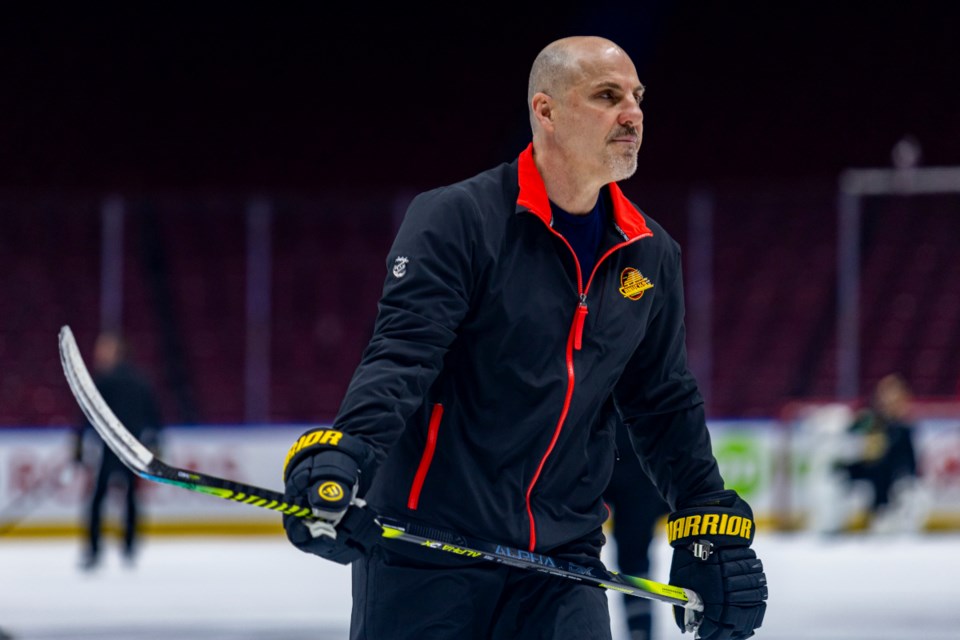Friday night’s Game 6 between the Nashville Predators and Vancouver Canucks will feature two finalists for the Jack Adams Award as coach of the year: Predators head coach Andrew Brunette and Canucks coach Rick Tocchet.
Perhaps that’s why this first-round series has been so low-event — just the way most NHL coaches like it.
Brunette and Tocchet were named finalists for the Jack Adams, along with Winnipeg Jets head coach Rick Bowness, on Friday morning.
All three teams significantly outperformed expectations, which has typically been the criteria for the Jack Adams. That excludes coaches who have consistently
Paul Maurice is the active leader in wins by an NHL coach and just coached the Florida Panthers to 110 points and the top of the Atlantic Division; he’s never won the Jack Adams. Peter Laviolette coached the New York Rangers to the Presidents’ Trophy; he’s never won the Jack Adams. Jon Cooper has a .640 points percentage and won two Stanley Cups with the Tampa Bay Lightning; no Jack Adams for him.
Canucks exceeded expectations more than any other team
When the expectations are lower, based on the quality of the roster and the team’s previous season, it’s a lot easier to attribute success to the head coach. Such is the case for the Canucks, Predators and Jets.
The Athletic’s preseason projections predicted 89.1 points for the Predators, placing them outside the playoff picture. They finished with 99 points and comfortably held the first Wild Card spot in the West in the tough Central Division — 9.9 points better than projected.
The Canucks were projected to finish with 92.4 points, which was actually the most bullish of the analytics-based projections. Instead, they won the Pacific Division with 109 points, 16.6 points better than projected.
The Jets were projected to finish with 96.0 points and cruised to 110 points to finish second in the Central — 14.0 points better than projected.
Of those three teams — and really of any team in the NHL — the Canucks exceeded expectations the most. They were considered a coin flip to even make the playoffs. Instead, they comfortably won the Pacific to earn home-ice advantage, even if it hasn’t been the advantage they were hoping for so far in the playoffs.
That alone might be enough to win Rick Tocchet the Jack Adams but it’s not just that the Canucks exceeded expectations but the way they exceeded expectations.
"It's an organizational award for me."
The system and structure that Tocchet introduced seemed to be the perfect fit for the roster — or, at least, most of the roster — and the Canucks became a far more disciplined and structured team.
The endless odd-man rushes that the Canucks gave up in previous seasons disappeared, as Tocchet emphasized the importance of keeping a forward high in the zone. The cross-seam passes that frequently forced five-alarm saves from the team’s goaltenders were erased, as Tocchet drilled the team in protecting “the guts” of the ice. The penalty kill, where coaching can make a massive difference, went from dead last at 71.6% last season to a respectable 17th at 79.1%.
Tocchet’s impact was clear to everyone who watched the Canucks this season and even more clear to those who regularly spoke to the players, who embraced Tocchet’s one-game-at-a-time, business-like approach to the season. On top of that, Tocchet struck the right balance in his relationships with the players, showing tough love when necessary, such as healthy-scratching Dakota Joshua, but always being willing to give one-on-one attention to help a player improve.
But Tocchet himself refuses to take sole credit for any aspect of the Canucks’ turnaround.
“Honestly, it’s an organizational award for me,” said Tocchet on Friday. “It’s the GM, the ownership, the assistant coaches, players, you’re a piece of the puzzle...I’ve got a huge support group that helps me, so that’s the way I look at it.”
The Canucks improved every aspect of their game
Still, it’s hard to ignore just how significantly the Canucks improved this season. Here are the Canucks’ score-adjusted rate statistics at 5-on-5 between last season and this season.
Here’s a quick glossary:
- CF and CA - corsi for and against, which is shot attempts
- SF and SA - shots for and against, which is pretty self explanatory
- SCF and SCA - scoring chances for and against, as estimated by Natural Stat Trick
- HDCF and HDCA - high-danger chances for and against, as estimated by Natural Stat Trick
- xGF and xGA - expected goals for and against — the number of goals expected from the shot quality and quantity, as estimated by Natural Stat Trick
- GF and GA - goals for and against — you know, goals
Every single one of those statistics improved, though the biggest improvement can be seen in the defensive statistics by selecting “Against” in the drop-down menu.
The Canucks allowed far fewer shot attempts, shots on goal, scoring chances, and high-danger chances at 5-on-5. Certainly, Thatcher Demko being healthy enough to play the majority of the season made a difference in the goals against, but he was far from the only factor.
The drastic reduction in scoring chances against, which doesn’t even take into account how much the Canucks limited puck movement prior to shots, is one of the biggest changes Tocchet brought to the table and a big reason why they won the Pacific Division. Sometimes, a hot goaltender can win a coach a Jack Adams Award by making a team look more defensively sound than they really are but Tocchet legitimately made life easier for his goaltenders this season.
Tocchet stands apart from other two finalists
Tocchet’s focus on creating and preventing scoring chances shows in the Canucks’ underlying statistics. In terms of corsi and shots on goal, the Canucks, Predators, and Jets are all very similar.
The Canucks jump ahead in scoring chances, however. Tocchets’ Canucks and Brunette’s Predators also are significantly better than Bowness’s Jets in high-danger chances, as the Jets relied on Connor Hellebuyck far more than the Canucks or Predators depended on their goaltending. That didn’t work out so well for the Jets in the playoffs.
What really sets Tocchet apart from the other two coaches, however, is how they dealt with trailing and leading in games, particularly one-goal games.
Here’s the Jets in different score situations via HockeyViz:
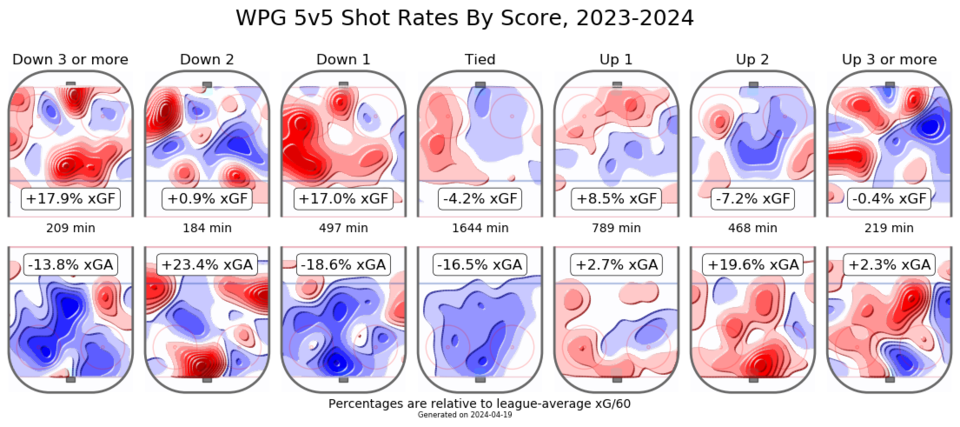
The Jets were quite good with the score tied — excellent defensively, albeit a little underwhelming offensively. When down by one, however, they dominated play, creating chance after chance while limiting chances for their opposition.
It’s when they were up by one that they started to struggle defensively — up by two it was worse. That’s when they depended on Hellebuyck to hold onto leads.
Here’s the Predators:
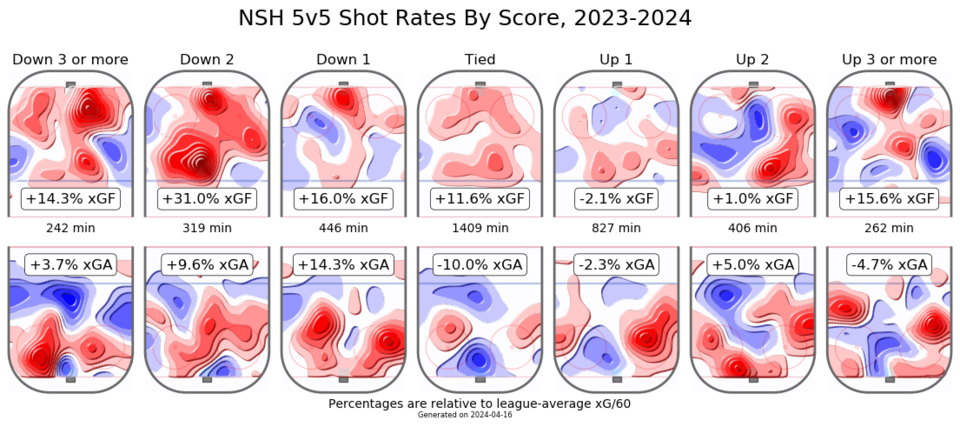
With the score tied, The Predators were outstanding both ways but, when the score shifted, they got into some trouble.
When down by one, the Predators created a decent amount of offence but gave up nearly as much. And, when up by one, they gave up far more chances than when the score was tied.
Then there’s the Canucks:
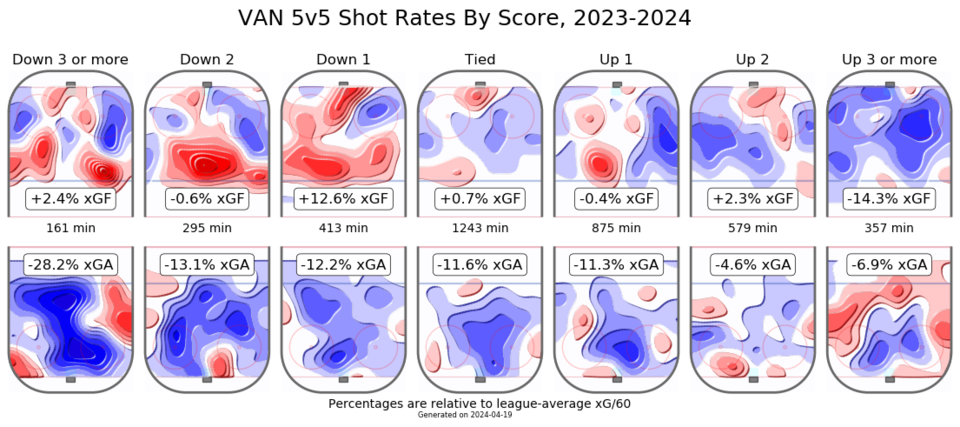
What’s stunning about the Canucks is how completely consistent they were defensively in different scoring situations.
When they were down by one, the Canucks created a lot more offence but didn’t give up anything defensively to get them. When they were up by one, the Canucks shut other teams down, giving them nothing to work with.
Let's also keep in mind that even though they seemingly didn't create many chances with the score tied, they were consistently able to open the scoring this season.
That consistent defence, no matter the score, is astoundingly different from how the Canucks played last season.
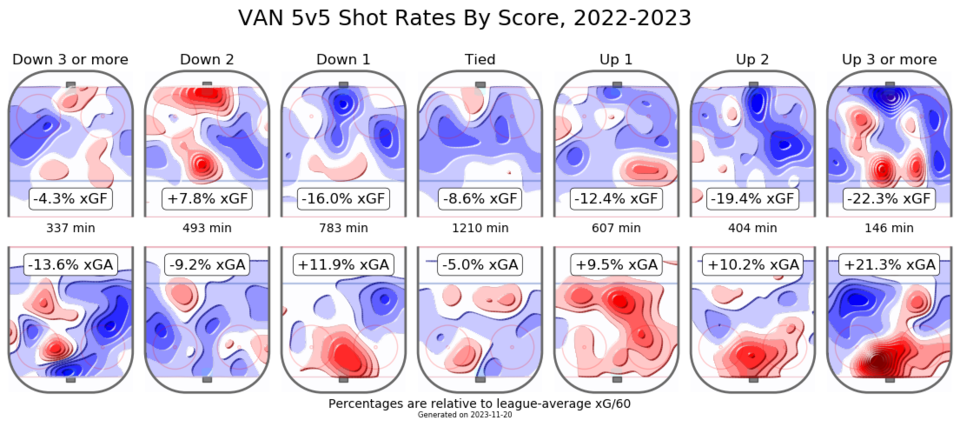
The Canucks last season couldn’t muster up any offence whatsoever when trailing by one goal and gave up a ton of chances to get that complete lack of offence.
When up by one — or worse, two or three — the Canucks bled chances against, giving up leads like they were going out of style.
While the Canucks certainly made other changes to improve the team, it’s impossible to ignore the impact of coaching. And that’s why Rick Tocchet deserves to win the Jack Adams this year.
